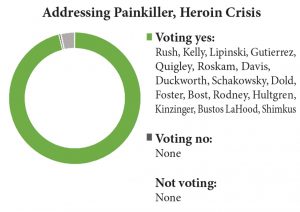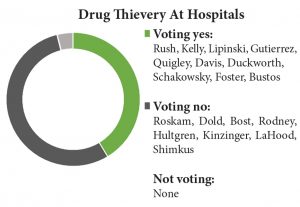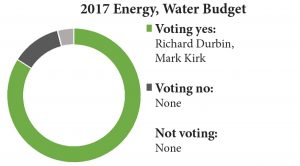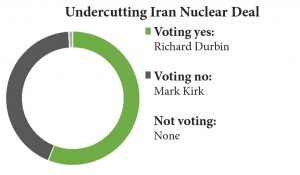How They Voted. Illinois Representatives’ Votes in Congress
Chronicle Media — May 15, 2016United States House of Representatives
 ADDRESSING PAINKILLER, HEROIN CRISIS: Voting 413 for and five against, the House on May 12 passed a bill (HR 5046) that would authorize $515 million through 2021 for Department of Justice grants to help communities deal with a nationwide epidemic in which dependence on opioid pain medicines often leads to heroin addiction and death by overdose. The bill would fund state, local and tribal actions such as expanding treatment and recovery programs; developing non-addictive pain-management treatments; adding drug task forces to police departments; conducting public-education and prevention programs; combating drug trafficking across international borders and state lines; developing evidence-based treatments for substance abuse and taking steps to keep unused and expired drugs from reaching children and traffickers.
ADDRESSING PAINKILLER, HEROIN CRISIS: Voting 413 for and five against, the House on May 12 passed a bill (HR 5046) that would authorize $515 million through 2021 for Department of Justice grants to help communities deal with a nationwide epidemic in which dependence on opioid pain medicines often leads to heroin addiction and death by overdose. The bill would fund state, local and tribal actions such as expanding treatment and recovery programs; developing non-addictive pain-management treatments; adding drug task forces to police departments; conducting public-education and prevention programs; combating drug trafficking across international borders and state lines; developing evidence-based treatments for substance abuse and taking steps to keep unused and expired drugs from reaching children and traffickers.
James Sensenbrenner, R-Wis., said drug overdoses “now surpass automobile accidents as the leading cause of injury-related death for Americans between the ages of 25 and 64. Nearly a half-million Americans lost their lives to drug overdoses in 2015….Yet, despite these staggering numbers, the crisis is getting worse.”
No member spoke against the bill.
A yes vote was to send the bill to conference with a similar measure passed by the Senate.
 DRUG THIEVERY AT HOSPITALS: Voting 190 for and 225 against, the House on May 12 refused to allow HR 5046 (above) to fund programs that would combat employee thievery of prescription painkillers at hospitals, clinics and distribution centers. Supporters called this a commonsense effort to reduce the black market for opioids, while opponents said the Drug Enforcement Administration already has programs to combat such illegal drug diversions.
DRUG THIEVERY AT HOSPITALS: Voting 190 for and 225 against, the House on May 12 refused to allow HR 5046 (above) to fund programs that would combat employee thievery of prescription painkillers at hospitals, clinics and distribution centers. Supporters called this a commonsense effort to reduce the black market for opioids, while opponents said the Drug Enforcement Administration already has programs to combat such illegal drug diversions.
Citing the painkillers OxyContin and Vicodin, Stephen Lynch, D-Mass., said: “One of the most frequent ways that these drugs make it to the street is after they have been stolen from a medical facility in which they are stored for legitimate use.”
Bob Goodlatte, R-Va., said that in light of parallel efforts by the Drug Enforcement Administration, “I must oppose the amendment as being duplicative and causing (a) waste of resources….”
A yes vote was to adopt the amendment.
United States Senate
 2017 ENERGY, WATER BUDGET: Voting 90 for and eight against, the Senate on May 12 passed a bill (HR 2028) that would appropriate $37.5 billion for energy, water and nuclear-safety programs in fiscal 2017. In part, the bill budgets $12.9 billion for securing the U.S. nuclear arsenal, $6.4 billion for environmental cleanup of former nuclear-weapons production sites and $6 billion for Army Corps of Engineers public-works projects. In addition, the bill appropriates $11.2 billion for energy programs; $5.4 billion for science research; $1.14 billion for the Bureau of Reclamation; $1.058 billion for nuclear-energy research and $632 million for fossil-fuel research.
2017 ENERGY, WATER BUDGET: Voting 90 for and eight against, the Senate on May 12 passed a bill (HR 2028) that would appropriate $37.5 billion for energy, water and nuclear-safety programs in fiscal 2017. In part, the bill budgets $12.9 billion for securing the U.S. nuclear arsenal, $6.4 billion for environmental cleanup of former nuclear-weapons production sites and $6 billion for Army Corps of Engineers public-works projects. In addition, the bill appropriates $11.2 billion for energy programs; $5.4 billion for science research; $1.14 billion for the Bureau of Reclamation; $1.058 billion for nuclear-energy research and $632 million for fossil-fuel research.
A yes vote was to pass the bill.
 UNDERCUTTING IRAN NUCLEAR DEAL: Voting 57 for and 42 against, the Senate on May 11 failed to reach 60 votes needed to advance a measure aimed at undercutting the recently implemented nuclear deal between Iran and six nations including the United States. The amendment to HR 2028 (above) sought to deny the administration funding it needs to purchase the “heavy water” used by Iran’s nuclear-weapons program. The U.S. plans to divert the chemically altered water to peaceful purposes such as medical and scientific research while removing it from the reach of global arms traffickers.
UNDERCUTTING IRAN NUCLEAR DEAL: Voting 57 for and 42 against, the Senate on May 11 failed to reach 60 votes needed to advance a measure aimed at undercutting the recently implemented nuclear deal between Iran and six nations including the United States. The amendment to HR 2028 (above) sought to deny the administration funding it needs to purchase the “heavy water” used by Iran’s nuclear-weapons program. The U.S. plans to divert the chemically altered water to peaceful purposes such as medical and scientific research while removing it from the reach of global arms traffickers.
Approved last year, the nuclear agreement requires Iran to effectively dismantle, for at least 10 years, a program thought to be months away from producing its first atomic weapon. In return, the international community is lifting economic sanctions on Iran and releasing at least $100 billion in Iranian assets frozen overseas.
Majority Leader Mitch McConnell, R-Ky., said the amendment “keeps America safe” because it would deny Iran funding it “could use to procure ballistic missiles or air defenses that could be used against us or our allies.”
Lamar Alexander, R-Tenn., said the amendment could open the door to Iran’s heavy water being sold “to another country, such as North Korea, and used to help make nuclear weapons.”
A yes vote was to advance the amendment.
— How They Voted. Illinois Representatives’ Votes in Congress —







